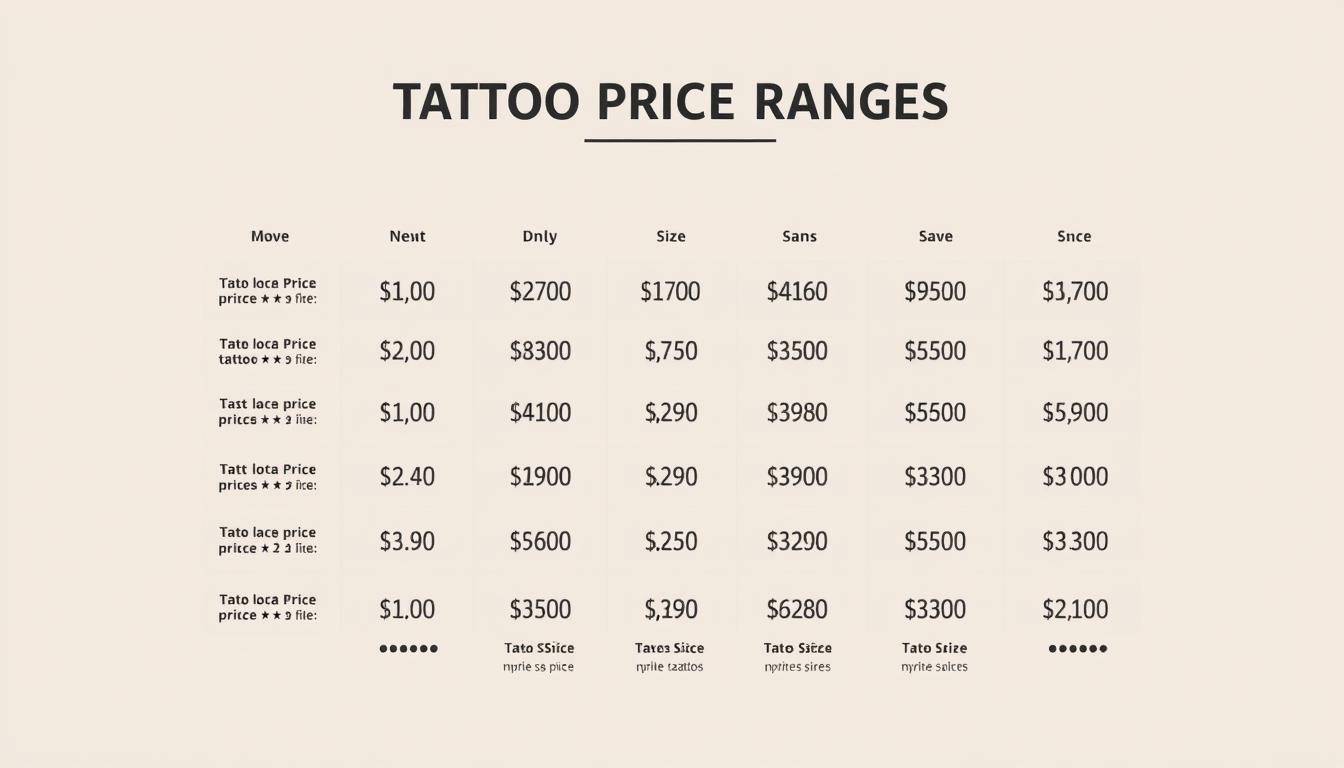
Thinking about getting a tattoo but unsure of the cost? You’re not alone. Tattoo prices change based on size, complexity, and where it’s placed.
Knowing the average tattoo cost helps with planning and budgeting. Whether it’s a small design or a big, detailed piece, understanding costs makes it easier.
For more info on starting your tattoo journey, check out our guide.
Key Takeaways
- Tattoo prices vary based on size, complexity, and location.
- The average cost of a tattoo can range widely.
- Understanding the factors that affect tattoo prices can help you budget.
- Researching and planning can make the tattoo process smoother.
- Consulting with a professional tattoo artist is essential.
Overview of Tattoo Pricing
The cost of a tattoo depends on several key factors. These factors can greatly affect your budget. Knowing what they are will help you plan your tattoo.
Factors That Affect Tattoo Costs
Several important factors influence tattoo prices. These include:
- Size: Larger tattoos need more time and ink, making them more expensive.
- Detail and Complexity: Designs with lots of details cost more because they take more skill and time.
- Body Placement: Tattoos in tricky spots can cost more because they’re harder for the artist.
- Artist Experience: More experienced artists charge more due to their skill and demand.
- Location: Studios in big cities or areas with high living costs may charge more than others.
A tattoo pricing guide shows how these factors affect costs. For example, simple designs on easy-to-reach areas are cheaper than complex ones in hard spots.
Understanding Pricing Models
Tattoo artists use different pricing models. Some charge by the hour, while others have a flat rate for certain designs. Knowing these models helps you budget better.
“The pricing for tattoos can vary a lot based on the artist’s experience and design complexity. It’s key to talk about pricing with your artist during the consultation.”
Hourly rates can vary from $50 to $200, depending on the artist and location. Flat rates give you a clear cost for your tattoo upfront.
Average Costs for Different Tattoo Sizes
The size of your tattoo greatly affects its price. Here’s a rough idea of what you might pay for tattoos of different sizes:
| Tattoo Size | Average Cost |
|---|---|
| Small (less than 5 inches) | $50-$200 |
| Medium (5-10 inches) | $200-$500 |
| Large (10-20 inches) | $500-$1,500 |
| Extra Large (over 20 inches) | $1,500-$3,000+ |
Keep in mind, these are just estimates. Actual costs can vary based on the factors mentioned earlier.
Tattoo Styles and Their Price Ranges
Different tattoo styles have different prices. This is because of the complexity and skill needed. Knowing the price range for your style helps you make a smart choice.
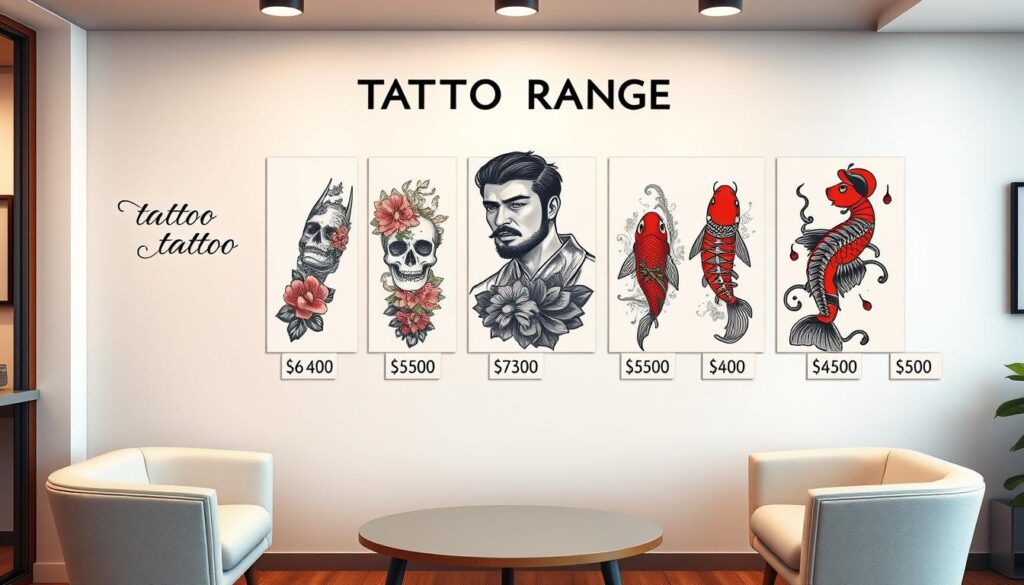
Traditional Tattoos
Traditional tattoos are loved for their bold lines and bright colors. Prices vary with size and detail. A small to medium-sized tattoo costs between $100 to $500.
Larger tattoos can cost $1,000 or more. This depends on the design’s detail and the artist’s skill.
Realistic Portraits
Realistic portraits need a lot of skill and are pricey. Prices start at $500 and can reach $2,000 or more for big, detailed designs. The high cost is due to the need for precision.
Geometric and Abstract Designs
Geometric and abstract tattoos are unique and can cost a lot. Simple ones start at $200. But, complex and large designs can cost $1,500 or more.
The uniqueness and originality of these designs make them worth the price. They are made just for you. For inspiration, check out nailcutandink.com.
When thinking about a tattoo, remember the cost isn’t just the initial price. You might also need touch-ups or aftercare products. Knowing the price ranges helps you plan your budget and find a tattoo that fits your budget.
The Importance of Tattoo Artist Experience
Tattoo artists with more experience usually charge more. But what does this mean for you? Knowing how an artist’s experience affects their pricing is key. It impacts both the quality and the cost of your tattoo.
Experienced tattoo artists have a big impact on your tattoo’s final look. Their skill level and reputation show in their prices. They’ve spent years perfecting their craft, ensuring top-notch work that’s worth the cost.
How Experience Influences Pricing
The price of a tattoo depends a lot on the artist’s experience. Artists with a strong portfolio and good reputation charge more. This is because they are in high demand and their work is of high quality. Here’s how experience affects pricing:
| Artist Experience Level | Average Cost per Hour | Quality Expectation |
|---|---|---|
| Beginner | $100-$200 | Basic |
| Intermediate | $200-$400 | Good |
| Advanced | $400-$600 | High |
As you can see, more experienced artists cost more. But, they usually deliver higher quality tattoos.
Finding the Right Artist for Your Budget
To find an artist that fits your budget, consider these steps:
- Research local artists and their pricing.
- Check their portfolios to gauge their experience and quality.
- Read reviews and ask for referrals.
By doing your research, you can find an artist that meets your needs and budget. Remember, while cost is important, the experience and reputation of the artist are key for a great tattoo.
Investing in an experienced tattoo artist can save you from future regrets and costs. Their expertise ensures your tattoo looks great and is done safely and hygienically.
Geographical Location and Tattoo Costs
Tattoo prices vary by location. Several factors, like local demand and cost of living, affect these prices. It’s key to know these differences when planning to get a tattoo.
Price Variations by Region
Regions have different tattoo prices. This is due to local demand, cost of living, and tattoo artist availability. For example, big cities on the East and West Coasts usually charge more than small towns in the Midwest.
Here’s a look at average tattoo prices in various regions:
| Region | Average Cost for Small Tattoo | Average Cost for Medium Tattoo | Average Cost for Large Tattoo |
|---|---|---|---|
| Northeast | $100-$300 | $300-$600 | $600-$1,200 |
| South | $80-$250 | $250-$500 | $500-$1,000 |
| Midwest | $70-$200 | $200-$400 | $400-$900 |
| West Coast | $120-$350 | $350-$700 | $700-$1,500 |
Urban vs. Rural Prices
Urban and rural areas have different tattoo prices. Urban areas, with higher living costs and more tattoo demand, charge more. For example, cities like New York or Los Angeles have higher rates. Smaller towns or rural areas often have lower prices due to lower costs.
When thinking about getting a tattoo, look at different locations. You might find better deals in nearby cities or towns without losing quality. For more tattoo cost info, check out nailcutandink.com.
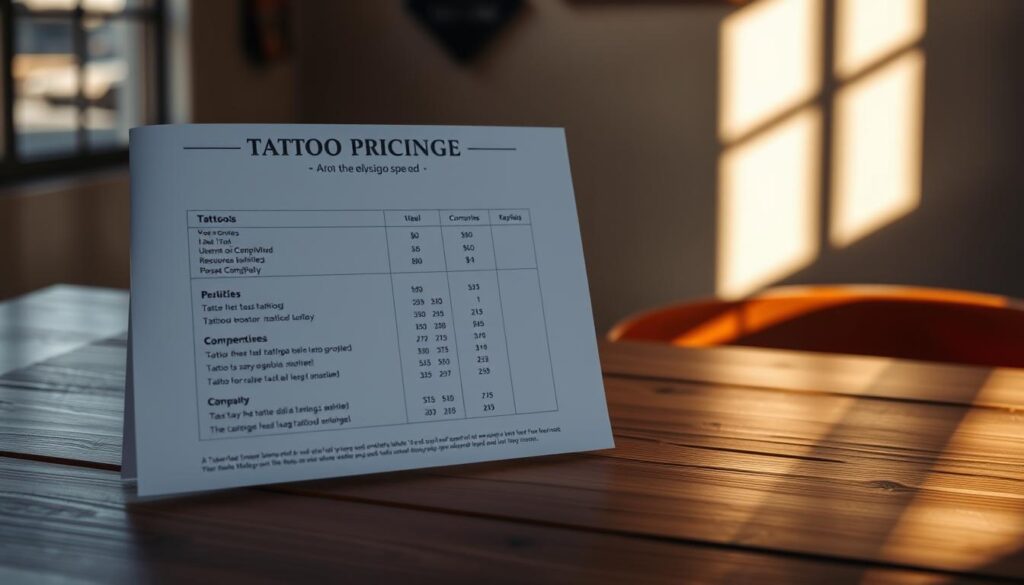
Tattoo Sizing and Complexity
The size and detail of your tattoo greatly affect its price. Bigger and more detailed tattoos need more time and skill. This makes them more expensive. Knowing this can help you budget better for your tattoo.
Small Tattoos: What to Expect
Small tattoos, under 2 inches, are usually cheaper. They need less time and detail, perfect for those watching their budget or wanting something subtle. Prices for small tattoos can start at $50 and go up to a few hundred dollars, based on the design and artist’s rates.
Large and Intricate Designs
Large and detailed tattoos are the priciest. They need a lot of time and detail. These tattoos can take many sessions and cost a lot of money. Prices can range from a few hundred to several thousand dollars, depending on size, detail, and artist’s experience.
Cover-Up Tattoos and Their Costs
Cover-up tattoos are more complex and costly. The price depends on the original tattoo’s size, color, and how well it can be hidden. Cover-ups are often pricier because they require more creativity and precision to hide the old tattoo.
When planning your tattoo, think about its size and detail. This will help you estimate costs. Talking to a professional tattoo artist can give you a better idea of what to expect and help you make a good choice.
Consultation Fees: Are They Worth It?
Getting a tattoo starts with a consultation, which affects the getting a tattoo price. This first meeting with your tattoo artist is key. It helps figure out your tattoo’s details and the costs. You’ll talk about your design, the tattoo’s size and complexity, and the total cost.
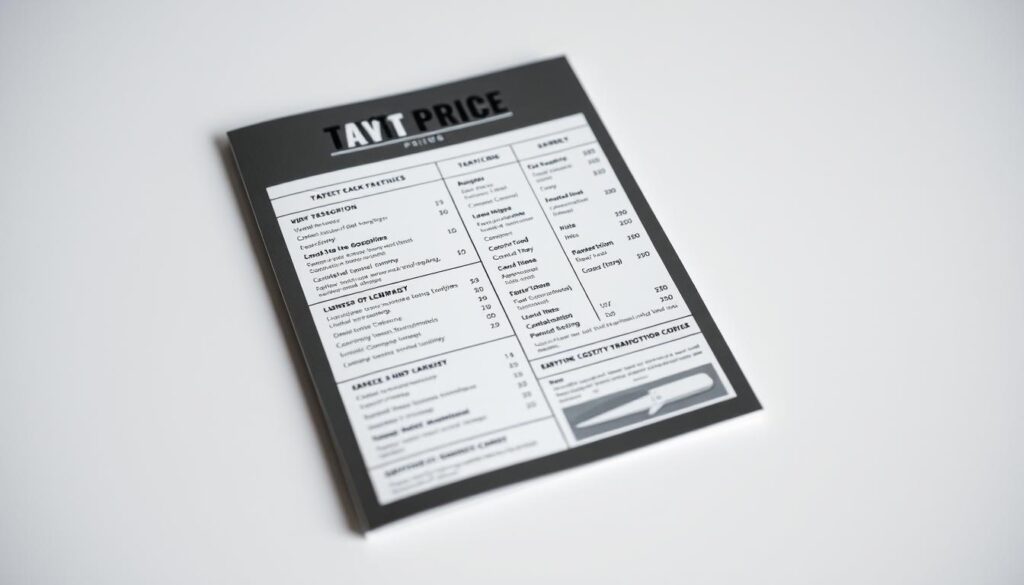
What to Expect During a Consultation
Your tattoo artist will look at your design ideas and offer advice. They’ll explain their tattoo artist pricing and how it fits your tattoo. You’ll get a clear cost breakdown, including the tattoo, any extra fees, and aftercare products.
Potential Costs to Consider
Some tattoo artists don’t charge for consultations, but others might. The fee can be from $20 to $100 or more, based on the artist’s experience and location. Remember to include this cost in your tattoo pricing guide. Also, think about aftercare products and any extra services, like touch-ups.
Knowing about consultation costs helps you decide on your tattoo project. It ensures you work with a skilled and trustworthy tattoo artist.
Aftercare Products and Their Price Impact
Proper aftercare is key to a tattoo’s longevity. Understanding the cost of aftercare products is essential. When you invest in a tattoo, you’re not just paying for the tattoo itself. You’re also paying for the products that will help it heal properly.
Essential Aftercare Items
The cost of aftercare products can vary widely. It depends on the brand, quality, and type of product. Essential aftercare items typically include:
- Soaps and cleansers designed for tattoo aftercare, which can range from $5 to $15.
- Moisturizers to keep the tattoo hydrated, priced between $10 to $30.
- Aftercare creams or ointments that promote healing, available for $15 to $40.
- Bandages or wraps to protect the tattoo, costing $5 to $10.
For more information on tattoo aftercare and related products, you can visit nailcutandink.com to explore additional resources.
Budgeting for Aftercare
To budget effectively for aftercare, consider the following tips:
- Buy products in larger quantities if you have multiple tattoos or plan to get more.
- Look for discounts or bundles that tattoo artists or studios offer.
- Read reviews to ensure you’re purchasing effective products, even if they’re slightly more expensive.
By understanding the costs associated with aftercare products and budgeting, you can ensure your tattoo heals properly. This way, it will remain vibrant for years to come. The average tattoo cost isn’t just about the initial price. It’s also about the ongoing care that contributes to its longevity.
Hidden Costs to Consider
Getting a tattoo is more than just the initial price. There are hidden costs to keep in mind. You’re not just paying for the tattoo. You’re also paying for the whole experience, including aftercare and possibly more sessions.
Touch-Up Sessions
After your first tattoo session, you might need touch-ups. Touch-up sessions are needed for various reasons. These include the tattoo’s age, your skin type, and how well you cared for it.
These sessions can increase the total cost. It’s important to include them in your budget. The price of touch-ups varies. It depends on the tattoo artist’s pricing model and the work needed.
Some artists offer free touch-ups within a certain time. Others charge a fee. This fee can be from $50 to $200 or more, based on the complexity.
Tips and Gratuities
It’s customary to show appreciation for your tattoo artist with tips and gratuities. The standard tip range is 15% to 20% of the total tattoo cost. For example, if your tattoo cost $500, a suitable tip would be $75 to $100.
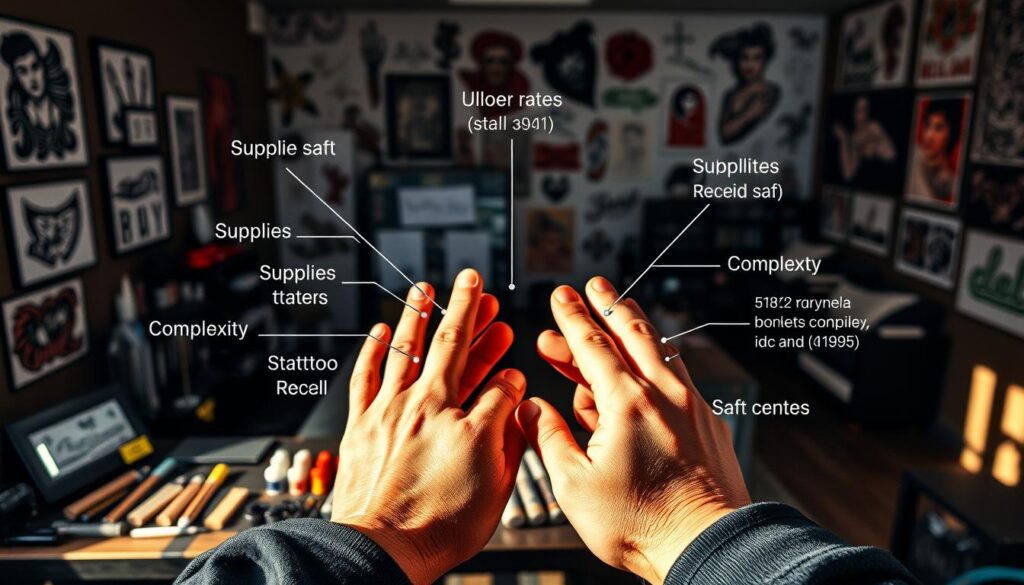
Some tattoo artists have specific policies on tips. It’s a good idea to ask about their policy during your consultation. Remember, tipping is not mandatory. It’s a way to show you’re happy with the service.
When planning for your tattoo, remember these additional costs. By including touch-up sessions and tips, you can budget better. This ensures a satisfying experience.
Discounts and Promotions for Tattoos
Tattoos can be pricey, but smart shoppers can find deals. Many tattoo artists and studios offer promotions. These are to attract new clients and thank loyal ones.
Finding Deals on Tattoos
To save on tattoos, know where to look. Follow local tattoo studios and artists on Instagram and Facebook. They often share promotions, discounts for first-timers, or limited-time offers.
Also, sign up for newsletters from tattoo studios. They send exclusive deals to subscribers. This helps you find affordable tattoo prices.
Loyalty Programs and Referrals
Loyalty programs can save you money on tattoos. Some studios reward repeat customers or those who refer friends. For example, you might get a discount on your next tattoo after a few sessions or for each friend you refer.
Referral programs benefit both you and the studio. They bring in new clients. Always ask your tattoo artist about loyalty or referral programs they offer.
| Program Type | Description | Potential Savings |
|---|---|---|
| First-Time Client Discount | Discounts for new clients | Up to 20% off |
| Loyalty Program | Rewards for repeat customers | 10%-15% off future tattoos |
| Referral Program | Discounts for referring friends | $50-$100 off per referral |
For more tattoo pricing info and design ideas, check out nailcutandink.com. It has details on various styles and their costs.
Budgeting for Your Tattoo: Tips and Tricks
Now that you know what affects tattoo costs, it’s time to plan your budget. Setting a realistic budget is key to getting the tattoo you want without overspending.
Financial Planning for Tattoos
To figure out your budget, think about the average tattoo cost and the factors that affect it. Consider the size, complexity, and location of your tattoo. Also, the tattoo artist’s experience matters.
Saving for Your Tattoo
After understanding the costs, start saving. Set aside a fixed amount each month until you have enough. This way, you can enjoy your new tattoo without worrying about money, knowing you’ve budgeted for it.
